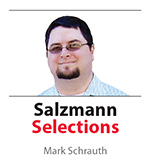 This week’s blog is a long overdue book review. The book, “Light and Shadows: Church History Amid Faith, Fact and Legend,” originally written in German by Fr. Walter Brandmuller (I’m sure everybody was expecting Pope Benedict XVI’s name there) was first published in 2007. It was released in English, in 2009, by Ignatius Press. Fr. Brandmuller is the president of the Pontifical Committee for Historical Sciences, and for almost 30 years was a professor of church history at the University of Augsburg.
This week’s blog is a long overdue book review. The book, “Light and Shadows: Church History Amid Faith, Fact and Legend,” originally written in German by Fr. Walter Brandmuller (I’m sure everybody was expecting Pope Benedict XVI’s name there) was first published in 2007. It was released in English, in 2009, by Ignatius Press. Fr. Brandmuller is the president of the Pontifical Committee for Historical Sciences, and for almost 30 years was a professor of church history at the University of Augsburg.
Fr. Brandmuller does a very good job of breaking down some difficult and complex subjects and dealing with them in an easy-to-read straightforward manner. Michael Miller, the translator, did an excellent job and it does not read like a translation at all. He does not hide from the fact that there have been problems with the church throughout history. However, where there has been considerable misconception and false accusations against the Church, he tries to look at the truth behind the fiction. Written from an European perspective, it is also interesting to note what Fr. Brandmuller focuses on, and he cites scholarly works that are little known in America.
Rather than being the reason the Middle Ages were so dreary, the church was the reason that they started to get out of squalor in the first place. Although he does not cite the work, he makes an off-reference to the fact that, contrary to popular Medieval opinion, Europeans traveled a great deal (relatively speaking) on pilgrimages and the like, and this brought knowledge and ideas from one end of Europe to the other. He takes a critical and historical look at the Incarnation and Birth of Jesus, can this “tale” make some sense historically? The French Revolution, and its attack on Catholicism, is vastly underreported here in America, and he spends a chapter looking at this time period, which in turn has led me to follow up on more detailed history of the era. That is the mark of a good historical book, in my mind.
He, of course, has to look at Luther and the Reformation. He has an interesting thought on the Reformers and their plan to take Christianity back to the beginning. “For history is open only toward the future, in the direction of the goal, and never backward toward the beginning. Therefore, the above-mentioned “liberating return to the origins” cannot take place any more than a return to some other development stage in the past. Such attempts are by definition reactionary and therefore destructive, not constructive (p. 153).”
I do not know if it was translated and republished this way or if this was how it was originally written, but there are no footnotes or endnotes or citations in the book. This is my major critique of the book itself. As mentioned above, he references a provocative thought about Medieval travel that is contrary to what I was taught for my History degree, which focused on Ancient and Medieval Europe. I really want to know where this new (or maybe old research that had been discarded for a while and is being revived) information has been found, and look at it myself. The book itself is well researched, and Fr. Brandmuller is very knowledgeable; he references works and passages from church Fathers, Middle Age writers, as well as German and American scholars both past and present throughout. However, no citations are given for these works, and I do not like that.
Being 286 pages, it is not a terribly long read, and one I highly recommend. My next book review will be Matthew Kelly’s “The Four Signs of a Dynamic Catholic,’ hopefully along with his “Rediscovering Catholicism” work as well.
As always, if you have any ideas and comments for things I could change, please let me know. If you have any books that you have read or have read the books I mention, please leave a comment. We here at Salzmann also want to know what people are reading. Comments are always appreciated – anything I can do to make this better I will strive my best to accomplish.
Here is some basic information about the library:
• Our standard hours are Tuesdays, Thursdays, 12 to 8 p.m.; Wednesdays, Fridays, Saturdays, 10 a.m. to 4 p.m.
• Our address is 3257 S. Lake Dr., St. Francis, WI 53235, right next to Henni Hall, due west of the South Parking Lot.
• The library’s phone number is (414) 747-6479. If you would like to contact me through email, it is mschrauth@sfs.edu.
• There is free Wi-Fi available.
• "Like" us on Facebook – Salzmann Library.
• The library catalog is available online.
